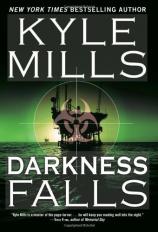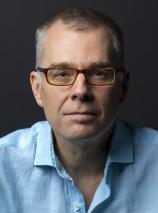Interview: November 30, 2007
November 30, 2007
Kyle Mills is the New York Times bestselling author of eight books, including RISING PHOENIX, THE SECOND HORSEMAN and FADE. In this interview with Bookreporter.com's Joe Hartlaub, Mills explains why he prefers to write about realistic and timely subjects, and discusses some of the parallels between real-life occurrences and events that take place in his latest novel, DARKNESS FALLS. He also reveals what he has learned through his research on alternative forms of energy, shares his thoughts on environmental issues and describes what he is currently working on.
Bookreporter.com: DARKNESS FALLS deals with an energy crisis occasioned by a designer bacteria that is used to sabotage the world’s largest oil fields. Ironically enough, it is being published just as oil prices reach $100 a barrel. Given that books are written --- and scheduled for publication --- several months in advance of their on-sale date, how did you manage to hit so close to the mark with DARKNESS FALLS? Luck, coincidence, or a crystal ball?
Kyle Mills: A little bit of all three. I’ve always been attracted to thrillers that feel as though they could happen tomorrow, so I try to make up as little as possible and write a book that is nothing more than a twist on a realistic prediction for the future.
The dark side of that philosophy, though, is that sometimes your timing is off. On September 7, 2001, I turned in a draft of a novel about al Qaeda smuggling a rocket launcher into the U.S. A few days later, my wife called me from work and told me that my book was being played out on the news.
BRC: Erin Neal is one of the most compelling figures in DARKNESS FALLS. He is a bit of an environmental renegade, fully embraced by neither radical environmentalists nor the establishment. His book, ENERGY AND NATURE, as described here, sounds impressive in its advocating a moderate energy policy that strikes a balance between rabid conservation and current energy use. Did you have anyone in mind when you created this character? And is there a real world model for ENERGY AND NATURE?
KM: The character is loosely based on Bjorn Lomborg, the author of THE SKEPTICAL ENVIRONMENTALIST. After the release of his book he suffered some pretty vicious attacks, despite the fact that it seemed to be a sincere effort at good science. I just extrapolated that out --- what if he had made his living as an environmentalist? What if all his friends had been environmentalists? It wasn’t hard to create a scenario where everyone my character knew would turn their backs on him.
As far as there being a real-world model for ENERGY AND NATURE, it was kind of a composite of THE SKEPTICAL ENVIRONMENTALIST and a paper called The Death of Environmentalism (Shellenberger/Nordhaus).
BRC: Just about everyone has an opinion regarding the environment. How did your research for DARKNESS FALLS affect your viewpoint regarding energy use?
KM: Sadly, it left me with a sense of hopelessness. When Al Gore, the poster boy for the fight against global warming, owns three houses totaling 15,000 square feet and flies around on a private jet, it makes it hard to ask a poverty-stricken person in China to give up their coal plant.
Realistically, the climate is going to change and whether that’s good or bad is a matter of perspective. If California ends up underwater, it’s a bad thing for Californians but a good thing for fish. Humans have always been better at adapting than thinking long-term.
BRC: On a related note, did something in your own experience that affected you personally --- anything from running out of gas to receiving an off-the-scale electric bill --- provide the jumpstart for DARKNESS FALLS?
KM: It was more the war in Iraq making me think about how dependent we are on foreign oil and how destructive our pursuit of it has been. The comparison to a heroin addict is probably an insult to heroin addicts.
BRC: The most impressive element of DARKNESS FALLS for me was the manner in which you extrapolated what would occur in the event of a significant oil shortage. Most people think of lines at gas pumps and expensive prices. You took things a bit further, and your scenario was all the more frightening for being so realistic and well thought out. Did you take your evaluation step by step, or did you come across a similar scenario during the course of your research?
KM: There is a lot of scary Peak Oil speculation out there --- books that predict catastrophe for the world as the oil runs out. I used those general theories to create a detailed alternate reality that a reader could imagine trying to live through.
It was an eye-opening exercise. How would I feed myself if trucks stopped delivering food to my grocery store? How would I keep myself warm? And when people started getting cold and hungry, how would I protect myself from the chaos that would almost certainly follow?
BRC: Another impressive factor of the book is the internal discussion regarding the cost of alternative energy. Few people seem to be aware that producing alternative forms of fuel actually consumes more energy than they save. Considering all of the research you performed while writing this novel, what would you ultimately consider to be the most effective form of alternative fuel?
KM: Without a doubt, nuclear is the most effective, but with it comes a lot of baggage. Ethanol, as it’s currently produced, is probably the least effective.
Many people are looking for a magic bullet --- a technology that will solve all our problems quickly and cheaply. Realistically, it will be a number of different technologies combined with massive increases in efficiency.
But as long as the oil is flowing, environmental gains will continue to be measured in “raised awareness” as opposed to meaningful programs.
BRC: DARKNESS FALLS is also noteworthy for featuring the return of Mark Beamon in a strong secondary role. Considering the end of the book, will we be seeing Beamon in any of your future novels?
KM: Until someone posed a similar question a few weeks ago, I had never thought about the fact that it might be hard for Beamon to escape the universe I created for him.
I have to admit that I haven’t figured out what I’m going to do. But the thought of never writing Mark Beamon again is kind of depressing.
BRC: What lured you into becoming a writer? And what do you think you would be doing if you were not writing?
KM: Honestly, I can’t say that I had major designs on becoming a writer. I turned out my first novel as a labor of love, without any real expectation that it would be published. I think I’m one of the rare people who fell into the profession rather than pursuing it.
If I weren't a writer, I supposed I’d still be working in finance. If I had to guess, I’d say real estate developer. I think writing suits me better, though.
BRC: Given all of the research involved in writing DARKNESS FALLS, did you need to adapt your writing schedule accordingly? How do you normally schedule your time? And what do you do when life gets in the way?
KM: Most of my books demand a lot of research, so I’m used to it. I generally do research and my outline at the same time so that they can feed off each other.
My goal is to work a normal 40-hour week. When I’m outlining, though, I tend to work shorter days because I can only think that hard for a few hours before I get a headache.
When life gets in the way, I react by panicking about my deadline.
BRC: What are you working on now? Do you have any plans for an ongoing series? And given that DARKNESS FALLS could be considered the ultimate disaster novel, have you entertained any thoughts about writing at least one book in another genre?
KM: I’m writing a thriller set in the world of African aid. I spend a lot of my winters in South Africa and have become fascinated by the way the continent works --- or doesn’t, as the case may be.
I’ve never been particularly attracted to series --- they tend to narrow my ability to explore different subjects. Maybe another Beamon book, though, if I can figure out how to do it.
It’s always tempting to write something in another genre and, to some extent, I once did. My book SMOKE SCREEN leans pretty far toward general fiction.
At least in the short term, though, I think I’m going to stick to what I know.




